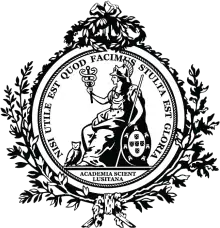Lisbon Academy of Sciences
The Lisbon Academy of Sciences GCSE (Portuguese: Academia das Ciências de Lisboa) is Portugal's national academy dedicated to the advancement of sciences and learning, with the goal of promoting academic progress and prosperity in Portugal.[1] It is one of Portugal's most prestigious scientific authorities and the official regulator of the Portuguese language in Portugal, through its Class of Letters.
Academia das Ciências de Lisboa | |
 | |
| Motto | Nisi utile est quod facimus stulta est gloria |
|---|---|
| Formation | 24 December 1779 |
| Headquarters | Lisbon, Portugal |
Official language | Portuguese |
Academy President | Carlos Eduardo do Rego da Costa Salema |
Secretary-General | Maria Salomé Soares Pais Telles Antunes |
| Website | acad-ciencias.pt |
History
.jpg.webp)
The academy was founded on 24 December 1779 in Lisbon, Portugal, by João Carlos de Bragança, Duke de Lafões, who served as the academy's first President, and José Correia da Serra, who served as its first secretary-general. Domenico Vandelli was among its mentors and early organizers.
The academy received royal patronage under Queen Maria I of Portugal in 1783, bestowing the title of Royal Academy of Sciences (Real Academia das Ciências) unto the institution.
The seat of the academy in Lisbon has been located in the Bairro Alto district of Lisbon since 1834.
Organization
The Academy has two classes: the Class of Sciences and the Class of Letters, and each has 30 full members and 60 corresponding members distributed in six sections. It also has a number of foreign members.
The Academy was one of the first national members of the International Council for Science, is one of two Portuguese members of the European Science Foundation and is the Portuguese partner of the European Science Exchange Programme of The Royal Society (United Kingdom).
Gallery
See also
References
- Saraiva, Luis. "The Lisbon Academy of Sciences and the development of mathematics in Portugal in the 19th century - Proceedings of the 2nd ICESHS (Cracow, Poland, September 6–9, 2006)" (PDF). 2iceshs.cyfronet.pl.
.jpg.webp)
.jpg.webp)
.jpg.webp)
.jpg.webp)
.jpg.webp)
.jpg.webp)
.jpg.webp)
.jpg.webp)
.jpg.webp)
.jpg.webp)